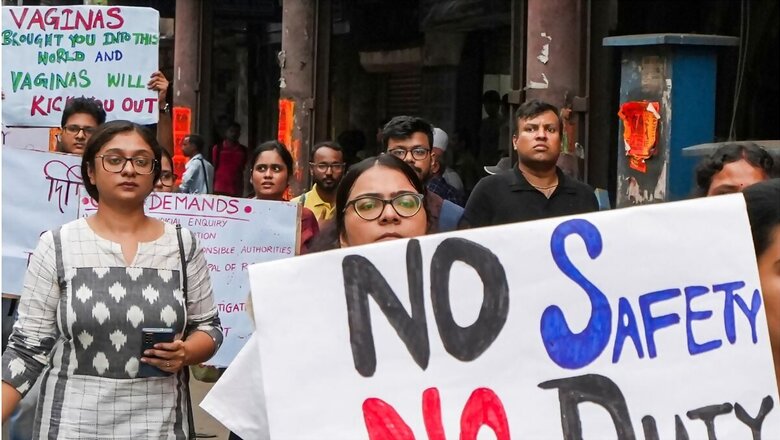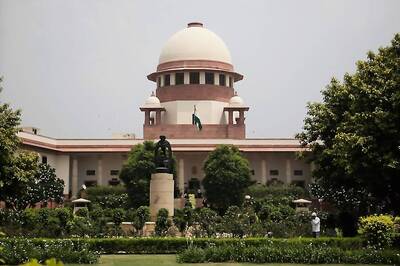
views
The recent rape and murder of a postgraduate trainee doctor at Kolkata’s RG Kar Medical College is a damning indictment of West Bengal’s hollow claims of safety for women. This atrocity, committed within the walls of a medical institution, lays bare the state’s failure to protect its citizens. Despite Chief Minister Mamata Banerjee’s repeated assertions that West Bengal is the safest state for women, this horrific crime exposes the administration’s blatant incompetence and disregard for women’s safety.
The police response has been nothing short of disgraceful, marked by glaring discrepancies in their actions. The Calcutta High Court’s order for an immediate CBI probe underscores the state’s despicable attempts to shield the real culprits. The police didn’t even inform the victim’s family of the rape and murder initially, instead concocting a false narrative and allegedly trying to “settle" the matter internally. This is not just negligence; it is a wilful betrayal of justice.
Mamata Banerjee’s political rhetoric is meaningless when women in Kolkata continue to live in fear, exposed to violence and exploitation. The state’s safety measures are a cruel joke, fostering a culture of impunity where criminals walk free and victims suffer in silence. Enough with the empty promises—what Bengal needs is real action. The state government must overhaul its approach to women’s safety, from enforcing stringent law enforcement to providing a robust support system for victims.
This tragedy cannot become another statistic in India’s grim record of gender-based violence. The public demands justice, not just for this victim, but for a safer future for all women. The question remains: will the government act decisively, or will it continue to fail its people? The clock is ticking.
The Incident
On August 9, 2024, the body of a postgraduate trainee doctor was tragically found in a seminar room at RG Kar Medical College and Hospital in Kolkata. The young doctor had been brutally assaulted, with an autopsy later confirming that she had been raped and murdered. Sanjay Roy, a civic volunteer associated with the Kolkata Police, was arrested the following day after police reviewed CCTV footage from the hospital. The autopsy revealed the horrific nature of the attack. The victim had multiple injuries, including severe trauma to her face, abdomen, throat, and genitals. There was evidence of bleeding from her eyes and mouth, and shards of glass were found in her eyes, indicating the sheer brutality of the assault. Additional injuries were noted on her belly, neck, left leg, right hand, and ring finger, along with deep nail marks on her back. The investigation suggested that the murder took place in the early hours of August 9.
Sanjay Roy, who had a history of violent behaviour and was reportedly addicted to pornography, confessed to the crime. He struck the victim with such force that her glasses shattered, driving shards into her eyes. After committing the heinous act, Roy returned to a police barrack and slept until the next morning. Police reconstructed the crime scene and gathered crucial evidence, leading to Roy’s swift arrest.
This shocking incident has ignited widespread outrage and protests among junior doctors, trainee doctors, and medical students, all of whom are demanding stronger security measures and justice for the victim. The case has also cast a harsh light on the safety of women in West Bengal, raising serious questions about the effectiveness of the current administration’s efforts to protect them.
Botched Up Police Investigation
The heinous crime has sent shockwaves across the nation, laying bare the grotesque ineptitude of the police investigation. This travesty has not only failed the victim and her family but also exposed the systemic rot within the law enforcement agencies.
From the outset, the investigation was a catastrophic mess, marred by staggering negligence and incompetence. The police’s failure to secure the crime scene promptly allowed crucial evidence to be potentially tampered with. The arrest of Sanjay Roy was based on flimsy CCTV footage and a dubious confession extracted under the influence of alcohol. The lack of rigorous forensic analysis and reliance on circumstantial evidence raised serious doubts about the investigation’s integrity.
The police’s inability to provide a coherent timeline of events further eroded their credibility, with conflicting statements from hospital authorities and the police adding to the confusion. The Special Investigation Team (SIT) seemed more focused on damage control than uncovering the truth.
The Calcutta High Court’s decision to transfer the case to the Central Bureau of Investigation (CBI) was a scathing indictment of the local police’s abject failure. The court’s criticism of significant lapses by hospital authorities and the police’s handling of the case highlighted the need for a competent and impartial investigation.
The people have no doubt that the police investigation was a botched and nonsensical exercise, characterised by mishandling of evidence, reliance on weak circumstantial evidence, and a lack of coherent strategy. This has not only delayed justice but also eroded public trust in law enforcement agencies. It is imperative that the CBI conduct a thorough, transparent, and impartial investigation to ensure justice is served and such lapses are not repeated.
A Case Marred by Negligence and Allegations of a Cover-Up
Allegations have emerged suggesting that the authorities may have attempted to shield the real culprits, further eroding public trust. The hospital administration, too, has faced scrutiny. Students have accused officials of neglecting repeated calls for enhanced security, with the removal of the hospital superintendent viewed as a reactionary measure. The swift reappointment of the former principal, amidst protests, has fuelled suspicions of a cover-up.
The TMC government’s reluctance to transfer the case to the CBI until public and judicial pressure mounted only deepens these concerns. As the case now moves to the CBI, there is an urgent need for a thorough and impartial investigation to restore public confidence.
Mamata Banerjee’s Political Rhetoric Must Stop
The tragic rape and murder of the postgraduate trainee doctor has exposed a grim reality in West Bengal: the failure of the Mamata Banerjee-led TMC government to ensure safety in the state’s institutions. Instead of confronting the grave lapses in security and governance, Mamata Banerjee and the TMC have resorted to political rhetoric and blame-shifting, further aggravating public outrage.
Banerjee, who holds dual responsibilities as chief minister and health minister, has a direct duty to protect citizens, especially within state-run institutions like RG Kar Medical College. Yet, her response to this horrific crime has been to deflect blame and downplay the systemic failures under her administration. This strategy of political deflection cannot absolve Banerjee of responsibility. As the leader of the state, she must acknowledge the shortcomings in her administration, take decisive action to prevent such incidents in the future, and restore faith in her leadership. Anything less is a betrayal of the trust placed in her by the people of West Bengal.
Calls for Accountability and Systemic Change
The incident has ignited a wave of protests among students, doctors, and medical staff. It has not only shattered the sense of security within the medical community but has also exposed deep flaws in the safety and administrative protocols of the institution.
At the heart of the protests is a demand for justice for the victim and a call for comprehensive safety reforms across medical colleges in West Bengal. Students and doctors are outraged by the administration’s failure to protect one of their own, despite repeated pleas for enhanced security measures. The hospital’s alleged negligence, coupled with the state’s ineffective response, has fuelled anger and frustration among the protesters.
The medical community is also demanding accountability from both the hospital administration and the state government, particularly Chief Minister Mamata Banerjee, who also serves as the health minister. The protesters argue that the government’s response has been inadequate, focusing more on controlling the narrative than addressing the underlying issues that led to this tragedy.
Women’s Safety Eroded Under TMC’s Watch
The tragic incident is a stark reminder of the growing danger women face in West Bengal under the TMC government. Despite Mamata Banerjee’s efforts to portray the state as a bastion of progress and women’s empowerment, the grim reality is that women’s safety is increasingly compromised. The TMC government has been lauded for welfare schemes like Laxmi Bhandar, aimed at empowering women economically. However, such programs lose their significance in a state where basic safety and security are not guaranteed. The incident at RG Kar Medical College is not an isolated case but a reflection of the systemic failures in ensuring the safety of women across Bengal. Under Banerjee’s leadership, the state has witnessed a disturbing rise in crimes against women, with many incidents going unreported or inadequately addressed.
The lack of a robust and effective response from the administration to such heinous crimes has further eroded public trust. Instead of focusing solely on welfare programs, Mamata Banerjee must acknowledge that true empowerment begins with ensuring the safety and security of all women. No amount of financial assistance can compensate for the trauma and fear that women experience when they are not safe in public spaces, educational institutions, or even within their homes. This is a wake-up call for Mamata Banerjee and her government.
Prioritising women’s safety is not just a matter of governance but a moral imperative. The TMC must urgently strengthen law enforcement, ensure swift justice for victims, and implement comprehensive measures to make West Bengal a safer place for women.
The author, a columnist and research scholar, teaches journalism at St. Xavier’s College (autonomous), Kolkata. His handle on X is @sayantan_gh. Views expressed in the above piece are personal and solely that of the author. They do not necessarily reflect News18’s views.



















Comments
0 comment